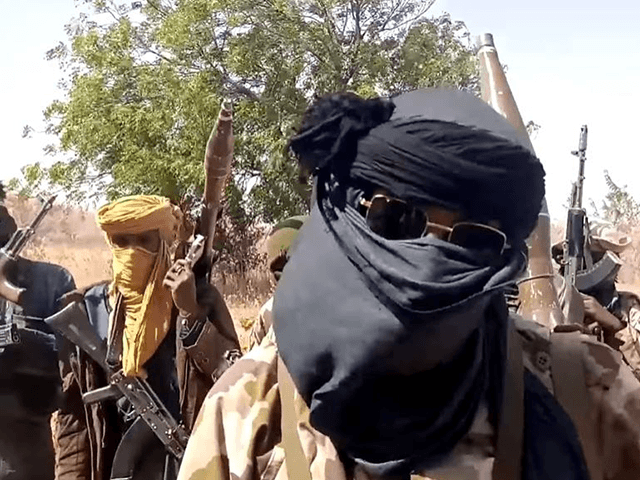A photo recently surfaced online that allegedly captures three Nigerian state governors in the presence of a known associate of Bello Turji, a Nigerian “banditry kingpin,” Nigeria’s Premium Times reported Wednesday.
The image in question allegedly shows Musa Kamarawa, a “confessed associate” of Turji, together with three Nigerian state governors: Zamfara State Gov. Bello Matawalle, Sokoto State Gov. Aminu Tambuwal, and Sokoto Deputy Gov. Mannir Dan Iyya.
Turji, 28, leads a terrorist gang that operates between the northwestern states of Sokoto and Zamfara. Kamarawa, 33, is the nephew of a former governor of Sokoto State named Attahiru Bafarawa. Police arrested Kamarawa in the Nigerian capital of Abuja in September 2021 along with Nigerian national Bashar Audu. The duo were “caught with a consignment of Indian hemp for Turji’s men,” the Daily Nigerian reported on January 15. Kamarawa allegedly “regretted” the previous support he provided Turji and “vowed to cooperate with the Nigerian security operatives” during his detainment.
A video in which Kamarawa divulges several details regarding Turji’s militant operation surfaced online in mid-January, according to the Daily Nigerian, which reviewed the footage. Kamarawa named in the video “local informants and collaborators” who allegedly “supply uniforms, food and drugs to the terrorists,” the online newspaper reported.
“Turji is surrounded by over 100 gunmen from his main operation base, besides other units,” Kamarawa said in the video. He additionally claimed Turji, whose real name is Muhammad Bello, oversees an armory that includes “AK 47 rifles, submachine guns, rocket launchers and anti-aircraft guns.”
The Daily Nigerian described Turji on January 15 as a “ruthless bandit leader” who has repeatedly rejected peace offerings by Zamfara’s government.
“The only time he said he was open to dialogue was when Kaduna-based Islamic cleric Ahmed Gumi, visited his camp in Zurmi, Zamfara State,” the online newspaper noted.
Kamarawa was among the first people contacted by Zamfara State Gov. Bello Matawalle in 2019 during an ultimately failed attempt at negotiating a peace deal with Turji’s terrorist operation, according to the Premium Times.
“Though Bello Turji didn’t accept the peace accord, there were a lot of bandits who turned in their guns and ammunition through Musa (Mr Kamarawa),” the newspaper revealed on January 19, citing an anonymous source at the Zamfara governor’s residence.
The newly surfaced photo allegedly showing Kamarawa together with Matawalle and Sokoto state’s governor and deputy governor caused an “uproar” among the Nigerian public in recent days, according to the Premium Times. Gov. Matawalle’s spokesman, Zailani Bappa, told the newspaper on Wednesday the photo in question was taken during the 2019 attempt by Matawalle to achieve peace with Turji and his gang of terrorists.
Nigeria’s most infamous terror group, Boko Haram, is a jihadist operation based out of northeastern Nigeria that has been active since 2009. Boko Haram made international headlines in April 2014 when it kidnapped about 270 mostly Christian schoolgirls from a state-run boarding school in Chibok, Borno State. About 113 victims of the abduction remain unaccounted for today.
Nigeria’s complex ethnoreligious landscape includes a population split nearly 50-50 between Muslims and Christians. Muslims dominate Nigeria’s north and have historically persecuted minority Christians living amongst them. A particular group of Muslim pastoralists known as Fulani herdsmen regularly passes through northwestern Nigeria. The nomads encourage their cattle to illegally graze on the farmland of local Christians, often sparking violent clashes between the two peoples. The phenomenon has spurred the evolution of some Fulani herdsmen into armed militiamen who terrorize local Christian villages in northwestern Nigeria with targeted attacks. While much reporting on the Fulani attacks describe the situation as a “conflict,” Christian attacks on Muslims are exceedingly rare, which the frequency of jihadist attacks on Christian villages has been increasing under Buhari.
The Daily Nigerian‘s description of Turji as a “bandit” on January 15 indicates that he may belong to such a tribe of Fulani terrorists.
“In Zamfara, as in the rest of the northwest, the term ‘bandit’ is shorthand for nomadic Fulani pastoralists,” the New Humanitarian noted in January 2021.
“Organised Fulani raids began on Hausa villages from around 2014 in an escalation of what had been more localised conflicts,” the non-profit news agency recalled. Hausa refers to an ethnic group indigenous to northern and southern Nigeria.
“In self-defence, vigilante groups formed with the backing of the state government, but their revenge was often indiscriminate – turning towns into no-go areas and driving some Fulani communities into the forests,” the New Humanitarian detailed.
“Fulani militia responded with even greater ferocity – and better weaponry – calling on nomadic kin from across the region for assistance. Sweeping into Hausa villages on motorbikes, they typically killed all the men they could find, on the assumption they were all vigilantes,” according to the Nairobi-founded news agency.
“What has resulted from the mayhem are two groups of forest-based armed men who both kill,” the New Humanitarian concluded. “There are Fulani militia that claim to defend their own, but equally intimidate their communities; and then there are hardcore armed criminals that are predominantly Fulani, but include Hausa – and anyone else attracted to making money.”

COMMENTS
Please let us know if you're having issues with commenting.